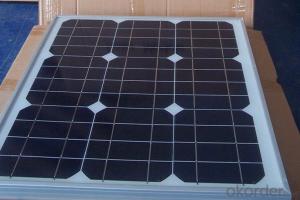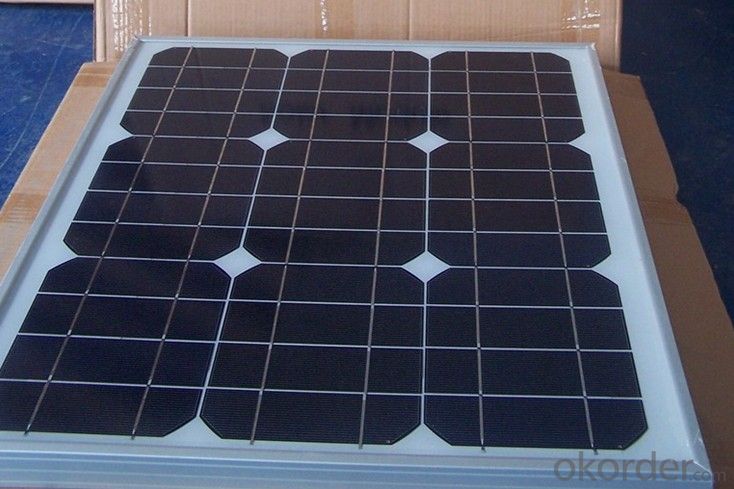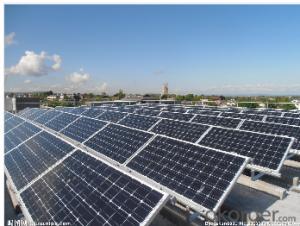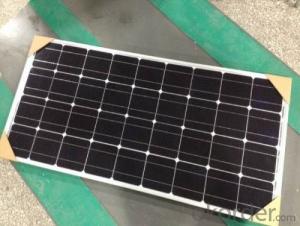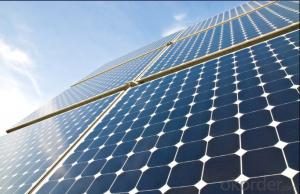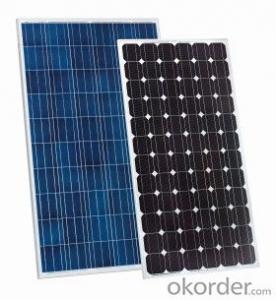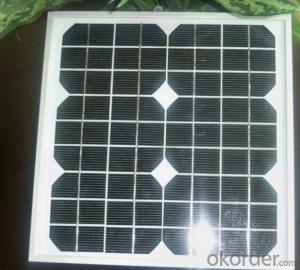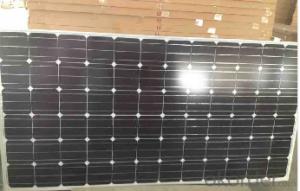Aa Solar Panels - Small Monocrystalline Solar Panel with Competitive Price CNBM
- Loading Port:
- Qingdao
- Payment Terms:
- TT OR LC
- Min Order Qty:
- 10 set
- Supply Capability:
- 300000 set/month
OKorder Service Pledge
OKorder Financial Service
You Might Also Like
1.5W to 180W Monocrystalline Solar Panel
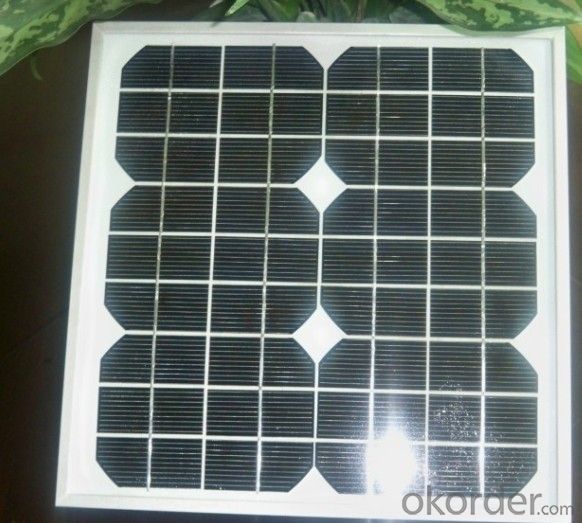
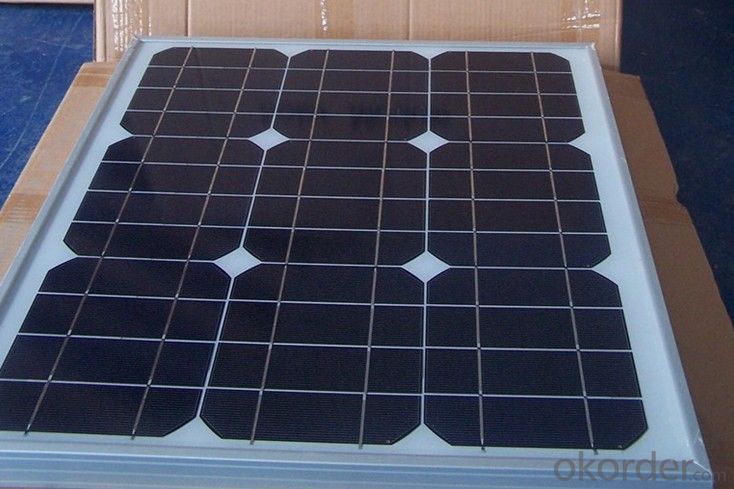
Quick Details
Place of Origin: | China (Mainland) | Brand Name: | CNBM | Model Number: | XRP-156M-250W |
Material: | Monocrystalline Silicon | Size: | 1620x992x40mm | Number of Cells: | 60 |
Max. Power: | 250w | Optimum Operating Voltage (Vmp): | 28.8V | Optimum Operating Current (Imp): | 8.68A |
Open Circuit Voltage (Voc): | 36V | Short Circuit Current (Isc): | 8.87A | Maximum Power at STC (Pmax): | 250W |
Operating Module Temperature: | -40 °C to +85 °C | Maximum System Voltage: | 1000 V DC (IEC) / 600V DC (UL) | Maximum Series Fuse Rating: | 15A |
Packaging & Delivery
Delivery Detail: | two weeks after order confirmation |
Features:
1) High Module conversion efficiency, through superior manufacturing technology
2) 0 to +5W positive tolerance for mainstream products
3) Certified to withstand high wind loads and snow loads
4) Anodized aluminum is for improving corrosion resistance
5) Anti-reflective, Highly transparent, low iron tempered glass
6) Excellent performance under low light environment
Benefit:
25-year performance warrant
10-year Product warranty
Electrical Characteristics:
Item No. | XRM-250W |
Optimum Operating Voltage (Vmp) | 28.8V |
Optimum Operating Current (Imp) | 8.68A |
Open Circuit Voltage (Voc) | 36V |
Short Circuit Current (Isc) | 8.87A |
Maximum Power at STC (Pmax) | 250W |
Cell Efficiency | 17.70% |
Operating Module Temperature | -40 °C to +85 °C |
Maximum System Voltage | 1000 V DC (IEC) / 600V DC (UL) |
Maximum Series Fuse Rating | 15A |
Power Tolerance | 0/+5 % |
STC: lrradiance 1000 W/m2, module temperature 25 °C, AM=1.5;
Best in Class AAA solar simulator (IEC 60904-9) used, power measurement uncertainty is within +/- 3%
Mechanical Characteristics:
No. of Cells | 60(6X10) |
Dimensions | 1640x992x40MM |
Weight | 20.0KGS |
Front | Glass 4.0 mm tempered glass |
Frame | Anodized aluminium alloy |
Temperature Characteristics:
Nominal Operating Cell Temperature (NOCT) | 45±2°C |
Temperature Coefficient of Pmax | -0.44 %/°C |
Temperature Coefficient of Voc | -0.33 %/°C |
Temperature Coefficient of Isc | 0.055 %/°C |
Refer to the Wmp range
Our factory can produce solar panel and solar module from 1.5W-290w (1.5w, 2.5w, 5w, 10w, 20w, 40w, 50w, 60w, 80w, 85w, 125w, 135w, 150w, 165w, 180w), according to customers requirement.
(A). Wmp range: 0.01W-6W, to be sealed with epoxy resin on PCB (printed circuit board), or to be sealed in plastic directly.
(B). Wmp range: 0.01W-15W, to be encapsulated with PET, on PCB (printed circuit board)
(C). Wmp range: 1W-60W, to be encapsulated with PET, on stainless steel, with holes for assembling purpose.
(D). Wmp range: 1W-290W, to be encapsulated with tempered glass, EVA, TPT, together with aluminium frame, junction box and (if necessary)diode and cable.
Refer to the material:
Monocrystalline solar cell or polycrystalline solar cell
Efficiency range 14%-17%, cell size 5/6.
- Q: where I can find solar panel the has 4.8 volts? Like those solar walkway light or something that has 4.8 volts solar panel.Do you think I can get it from home depot?
- How Solar Cells Work by Scott Aldous Inside This Article . Introduction to How Solar Cells Work 2. Photovoltaic Cells: Converting Photons to Electrons 3. How Silicon Makes a Solar Cell 4. Anatomy of a Solar Cell 5. Energy Loss in a Solar Cell 6. Solar-powering a House 7. Solving Solar-power Issues 8. Solar-power Pros and Cons 9. Lots More Information 0. See all Physical Science articles You've probably seen calculators that have solar cells -- calculators that never need batteries, and in some cases don't even have an off button. As long as you have enough light, they seem to work forever. You may have seen larger solar panels -- on emergency road signs or call boxes, on buoys, even in parking lots to power lights. Although these larger panels aren't as common as solar powered calculators, they're out there, and not that hard to spot if you know where to look. There are solar cell arrays on satellites, where they are used to power the electrical systems. You have probably also been hearing about the solar revolution for the last 20 years -- the idea that one day we will all use free electricity from the sun. This is a seductive promise: On a bright, sunny day, the sun shines approximately ,000 watts of energy per square meter of the planet's surface, and if we could collect all of that energy we could easily power our homes and offices for free.
- Q: For my exam in science we are required to make a power point explaining why it would be good for our school to switch to solar. our complete handout given to us by our teacher is as follows:Power Point to include:. What you propose for alternative energy usea. Any thoughts on energy conservation...2. Why this is a good idea3. What information you would give the solar company (area of roof space your group determined to be useable for solar)In PowerPoint - include your quot;scriptof what you would be saying when the slide is up in the Notes section below the slideANY HELP WOULD BE GREATLY APPRICIATED!!THANK YOU SO SO MUCH,QH
- Create okorder /
- Q: How do solar panels impact the electric bill?
- Solar panels can significantly reduce or even eliminate the electric bill. By generating electricity from sunlight, solar panels can offset the amount of power needed from the grid. This means that homeowners or businesses with solar panels can consume less electricity from the utility company, resulting in lower energy bills. In some cases, excess solar energy can be exported back to the grid, earning credits that further reduce the electric bill.
- Q: How do I choose the right size of solar panels for my home?
- To choose the right size of solar panels for your home, you should consider factors such as your average electricity consumption, available roof space, and budget. Start by analyzing your energy usage over the past year to determine your average daily kilowatt-hour (kWh) consumption. Next, calculate the solar panel system size needed by dividing your average daily consumption by the average daily sunlight hours in your area. Additionally, assess your roof's orientation, shading, and structural capacity to determine the maximum number of panels it can accommodate. Finally, take your budget into account and consult with a professional solar installer to help you determine the appropriate size and type of solar panels that best meet your energy needs.
- Q: What is the difference between Photovoltaic Panels and Solar Panels?
- Photovoltaic is a type of solar panel that produces electricity from sunlight, usually converting about 5% - 22% of the energy received from the sun into usuable energy. There are different types including those grown in a lab, silicone, and glass. Another type of solar panel is solar thermal which convert sunlight into heat. This is usually ran into some sort of system that heats water or a mixture w/ glycol in colder regions. This hot water can be used for showers, etc, or heating the home. You get much more bang for your buck with solar thermal.
- Q: Can solar panels be used to power outdoor lighting?
- Yes, solar panels can be used to power outdoor lighting. Solar-powered outdoor lighting systems typically consist of solar panels that collect and convert sunlight into electricity, which is then stored in batteries. This stored energy is used to power the outdoor lighting fixtures at night or in low-light conditions. This sustainable and cost-effective solution eliminates the need for traditional electrical wiring and reduces energy consumption.
- Q: I'm doing a project for school where I will buy a solar panel and utilize/improve the power output of the panel. I want the panel to have an improved amount of energy output compared to the original. My budget for the solar panel itself is ~$00. Anything else that will be needed is covered.Also, I will be comparing the power by lighting a light bulb and checking to see the output energy of the panel.Where or how should I approach this project?What are the parts of the solar panel that I will need to buy?What factors could I change/improve to improve the overall energy output?What are the things (other than the panel) that I will need to buy?How can I attach a light bulb to the solar panel?
- Solar okorder /
- Q: I know there's different brands of solar panels and they cost different amounts.But if anyone know the average price of one solar panel could you help me out?Also could you please list the size of the solar panel.
- Solar panels come in all sizes, from one that is in your calculator to 0 or 20 feet on a side. link has several examples with size and power. if you want more, search google for buy solar panel 00w or 200w or 50w to get a list with prices. .
- Q: hi guys, i need help, okay lets say i decide to put solar panels near a place where its inhabitated by people, what kinda of environmental factors should i consider? Will the solar panels cause any damage to the enviromnent around it? Will it affect the plant and animals around it? should i consider the weather? its for my class so if u guys can help thankx.
- You would need to consider how much sun your area gets on average. You would need to do a cost/benefit analysis to decide if you will be saving money eventually. Environmentally, it would not affect the plants or animals around it, except those it might block the sun from. Meaning, the grass growing in the shade of the panels will probably die out, but that goes for anything that would cast shade for the majority of the time. Solar panels are simply rechargers for the batteries it's hooked up to. No different than a cell phone charger affects the area, people or plants around it. If it is a worry, make some orgonite and place it around the panels. :)
- Q: planning to get one, for a store/house, we use alot of electricity at least 500-3000 dollars a month. how much money would this save us? how big would we have to get the solar panel?[aproximately]
- Consider installing building energy measurement first, which cost less than $200. Work out what is using the energy and if there are more efficient options. Consider co-generation which uses gas for an energy input and electricity generation and heat as an output. Use the Solar Energy Calculator to work out how much solar panel area is needed to generate the remaining power needed in you are of the world.
Send your message to us
Aa Solar Panels - Small Monocrystalline Solar Panel with Competitive Price CNBM
- Loading Port:
- Qingdao
- Payment Terms:
- TT OR LC
- Min Order Qty:
- 10 set
- Supply Capability:
- 300000 set/month
OKorder Service Pledge
OKorder Financial Service
Similar products
Hot products
Hot Searches
Related keywords
